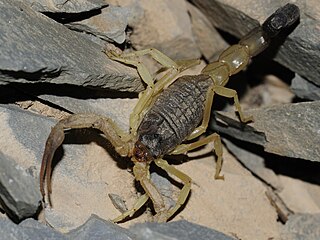
Scorpions are predatory arachnids of the order Scorpiones. They have eight legs and are easily recognized by a pair of grasping pincers and a narrow, segmented tail, often carried in a characteristic forward curve over the back and always ending with a stinger. The evolutionary history of scorpions goes back 435 million years. They mainly live in deserts but have adapted to a wide range of environmental conditions, and can be found on all continents except Antarctica. There are over 2,500 described species, with 22 extant (living) families recognized to date. Their taxonomy is being revised to account for 21st-century genomic studies.

The Buthidae are the largest family of scorpions, containing about 100 genera and 1339 species as of 2022. A few very large genera are known, but a high number of species-poor or monotypic ones also exist. New taxa are being described at a rate of several new species per year. They have a cosmopolitan distribution throughout tropical and subtropical environments worldwide. Together with four other families, the Buthidae make up the superfamily Buthoidea. The family was established by Carl Ludwig Koch in 1837.
Tamapin is a toxin from the Indian Red Scorpion, which is a selective and potent blocker of SK2 channels.

Delta is an Old World genus of potter wasps with species predominantly distributed through tropical Africa and Asia. Some species are present in the Palearctic region, and a few have been introduced in the Nearctic and Neotropical regions. The members of this genus have a long metasomal petiole, like members of the genera Eumenes and Zeta.

Hottentotta is a genus of scorpions of the family Buthidae. It is distributed widely across Africa, except for most of the Sahara desert. Species in the genus also occur in the Middle East, the Arabian Peninsula, southeastern Turkey, Iraq, Iran, Afghanistan, Pakistan, India, Nepal, Cape Verde Islands, and Sri Lanka (introduced).

Hottentotta tamulus, the Indian red scorpion, also known as the eastern Indian scorpion, is a species of scorpion of the family Buthidae. It occurs in most of India, eastern Pakistan and the eastern lowlands of Nepal, and recently from Sri Lanka.

Ceroplesis is a genus of flat-faced longhorn beetle in the subfamily Lamiinae of the family Cerambycidae.

Eurygaster is a genus of shield bugs, typical of the subfamily Eurygastrinae and tribe Eurygastrini, widespread in Eurasia, with some species in North America. At least two species are considered economically important sunn pests.

Liocheles australasiae, the dwarf wood scorpion, is a species of scorpion belonging to the family Hormuridae.

Ceroplesis hottentotta is a species of beetle in the family Cerambycidae. It was described by Johan Christian Fabricius in 1775. It is known from South Africa. It contains the variety Ceroplesis hottentotta var. disjuncta.
Hottentotta finneganae is a species of scorpion, belonging to the family Buthidae. It was first found in Pakistan.
Hottentotta jabalpurensis is a species of scorpion, belonging to the family Buthidae. It was first found in Jabalpur, Madhya Pradesh, India.
Hottentotta jalalabadensis is a species of scorpion of the family Buthidae. It was first found in Afghanistan.
Hottentotta stockwelli is a species of scorpion of the family Buthidae. It was first found in Andhra Pradesh and Maharashtra, India.

Hottentotta conspersus, the Sesriem scorpion, is a species of scorpion of the family Buthidae.
Hottentotta caboverdensis is a species of scorpions of the family Buthidae. The species was described by Wilson R. Lourenço and Eric Ythier in 2006. The specific name caboverdensis refers to Cape Verde, where the new species was found.

Hottentotta jayakari, the black-tailed alligatorback scorpion, is a species of scorpion of the family Buthidae. It is geographically widespread, occupying much of the Arabian Peninsula and Iran.

Hottentotta rugiscutis is a species of scorpion which is endemic to India.











